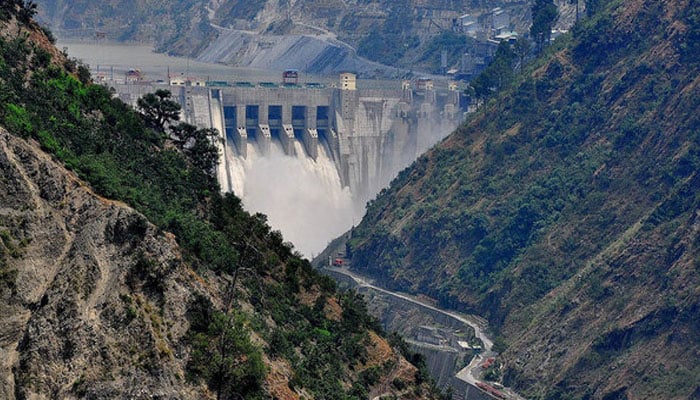Indus Waters Treaty: Pakistan, India to discuss hydropower projects
New Delhi and Islamabad are set to start talks at the PCIW level under Indus Waters Treaty
ISLAMABAD: New Delhi and Islamabad are set to start talks at the Permanent Commission of Indus Waters (PCIW) level under Indus Waters Treaty (IWT) on 10-point agenda, including hydropower projects Pakal Dal (1,000MW), Kiru (624MW), Lower Kalnai (48MW) being erected on the Chenab river and other projects being constructed on the Indus at Ladakh.
Pakistan considers the design of the above three hydropower projects as violative of the provisions of the Indus Waters Treaty (IWT), but India claims they are Treaty compliant. Under the IWT signed in 1960, waters of eastern rivers Sutlej, Beas, and Ravi, amounting to around 33 million acre-feet (MAF) annually were allocated to India for unrestricted use. The waters of western rivers Indus, Jhelum, and Chenab, amounting to around 135 MAF annually were assigned largely to Pakistan. However, India is permitted to construct the run-of-the-river plants on western rivers with limited storage as per criteria specified in the treaty.
Under the provisions of Article VIII (5) of the Indus Waters Treaty, the Permanent Indus Commission is required to meet regularly at least once a year, alternately in India and Pakistan. A 10-member delegation to this effect will arrive in Pakistan on February 28 through the Wagha border to hold three-day talks in Islamabad from March 1-3 and return on March 4. The Indian side will be headed by Pradeep Kumar Saxena, Indian Commissioner for Indus Waters, and comprises three female officers, besides others. The Pakistan side will be led by Syed Mehr Ali Shah, who is also Pakistan’s Commissioner for Indus Waters.
When contacted, Pakistan Commissioner for Indus Waters, Syed Mehr Ali Shah, was hopeful that contentious issues about the design of Pakal Dal (1,000MW) and Lower Kalnai would be resolved during bilateral dialogues at the Permanent Commission of Indus Waters (PCIW) level. He said Pakistan has already raised objections over the Pakdal project in the last talks with India, under Article 9 of the Waters Treaty, which would again be deliberated. He expressed the optimism that Pakistan's objections on the freeboard of the Lower Kalnai project, will be resolved during these talks. Pakistan wants the freeboard to be one meter in length, while India insists on a 2-meter length. Mentioning the Kiru Hydropower project, Shah said that Pakistan had earlier sought an explanation on the design. During these talks, India will submit clarifications over Pakistan's objections. He said Pakistan would also seek Indian commitment for sharing water flows data ahead of the next flood season.
However, top sources said that India has not only finished civil works but also almost completed the diversion tunnel for the Kiru Hydropower Project of 624MW on the Chenab River. According to the sources, “On the site of Kiru project, work on the diversion tunnel, excavation of main access tunnel and audit of top and bottom pressure shaft is in progress along with the dam's abutment stripping. The project is scheduled to be completed by 2023. The dam has a height of 136 meters and a width of over 190 meters."
The Indian engineers have almost completed the construction of the first diversion tunnel having a length of over 650 meters and 9-meter in diameter. More importantly, the over and invert concreting of the tunnel is almost near completion. The Pakistan Commission of Indus Water has not visited the site of the project. The Pakistan commissioner said he will soon undertake the visit to the project.
About the Pakal Dal Hydropower project having the capacity to generate 1,000 MW on Chena River, the sources said Pakal Dal dam has a height of 167 meters with 305 meters width. The work on diversion tunnel was completed while the river's diversion was achieved on November 1, 2021.
-
 Royal Family Shares Princess Anne's Photos From Winter Olympics 2026
Royal Family Shares Princess Anne's Photos From Winter Olympics 2026 -
 Tori Spelling Feels 'completely Exhausted' Due To THIS Reason After Divorce
Tori Spelling Feels 'completely Exhausted' Due To THIS Reason After Divorce -
 SpaceX Successfully Launches Crew-12 Long-duration Mission To ISS
SpaceX Successfully Launches Crew-12 Long-duration Mission To ISS -
 PlayStation State Of Play February Showcase: Full List Of Announcements
PlayStation State Of Play February Showcase: Full List Of Announcements -
 Ed Sheeran, Coldplay Caught Up In Jeffrey Epstein Scandal
Ed Sheeran, Coldplay Caught Up In Jeffrey Epstein Scandal -
 Paul Anthony Kelly Reveals How He Nailed Voice Of JFK Jr.
Paul Anthony Kelly Reveals How He Nailed Voice Of JFK Jr. -
 US, China Held Anti-narcotics, Intelligence Meeting: State Media Reports
US, China Held Anti-narcotics, Intelligence Meeting: State Media Reports -
 Victoria, David Beckham React To Marc Anthony Defending Them Amid Brooklyn Drama
Victoria, David Beckham React To Marc Anthony Defending Them Amid Brooklyn Drama -
 Victoria Wood's Battle With Insecurities Exposed After Her Death
Victoria Wood's Battle With Insecurities Exposed After Her Death -
 Prince Harry Lands Meghan Markle In Fresh Trouble Amid 'emotional' Distance In Marriage
Prince Harry Lands Meghan Markle In Fresh Trouble Amid 'emotional' Distance In Marriage -
 Goldman Sachs’ Top Lawyer Resigns Over Epstein Connections
Goldman Sachs’ Top Lawyer Resigns Over Epstein Connections -
 How Kim Kardashian Made Her Psoriasis ‘almost’ Disappear
How Kim Kardashian Made Her Psoriasis ‘almost’ Disappear -
 Gemini AI: How Hackers Attempt To Extract And Replicate Model Capabilities With Prompts?
Gemini AI: How Hackers Attempt To Extract And Replicate Model Capabilities With Prompts? -
 Palace Reacts To Shocking Reports Of King Charles Funding Andrew’s £12m Settlement
Palace Reacts To Shocking Reports Of King Charles Funding Andrew’s £12m Settlement -
 Megan Fox 'horrified' After Ex-Machine Gun Kelly's 'risky Behavior' Comes To Light
Megan Fox 'horrified' After Ex-Machine Gun Kelly's 'risky Behavior' Comes To Light -
 Prince William's True Feelings For Sarah Ferguson Exposed Amid Epstein Scandal
Prince William's True Feelings For Sarah Ferguson Exposed Amid Epstein Scandal




